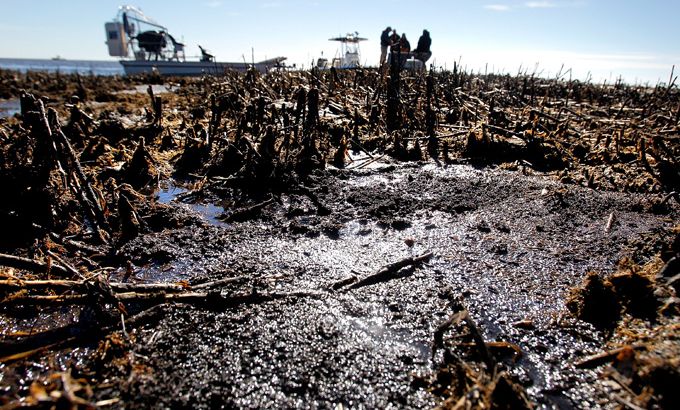
The BP oil spill: Two years on
Al Jazeera revisits Louisiana and finds shrimp without eyes, crabs without claws and a fishing industry in decline.
Shrimp without eyes, crabs without claws and a fishing industry in decline – two years after the massive Gulf of Mexico oil spill, scientists and fishermen tell Al Jazeera that its impact is becoming clearer and things are getting worse.
| In Depth | ||||||||||
|
When BP’s Deepwater Horizon oil rig exploded two years ago it killed 11 people and released millions of barrels of oil into the Gulf of Mexico.
Keep reading
list of 4 itemsTurtles swimming to extinction in Malaysia as male hatchlings feel heat
Could shipping containers be the answer to Ghana’s housing crisis?
Thousands protest against over-tourism in Spain’s Canary Islands
Then, in an attempt to break up the oil, BP poured nearly two million gallons of dispersant in after it.
Now Al Jazeera has returned to the region to investigate the impact of the worst man-made environmental disaster in US history.
Gulf oil drillers are having their busiest year since 2010, but fishermen say their businesses are still suffering and scientists report seeing a disturbing amount of mutated sea life.
After the deadly explosion at BP’s Macondo well, 4.9 million barrels of light sweet crude flowed into the Gulf of Mexico and onto the US coastline.
The rich ecosystems of Louisiana’s marshlands have been damaged and are struggling to recover. And just one or two contaminated species can affect the entire food chain.
Scott Eustis, a coastal wetlands specialist, says: “We have some evidence of deformed shrimp, which is another developmental impact. So that shrimp’s grandmother was exposed to oil while the mother was developing. But it’s the grandchild of the shrimp that was exposed [that] grows up with no eyes.”
However, in a statement to Al Jazeera, BP says: “Every seafood sample from reopened waters has undergone rigorous testing for oil and dispersants – and every sample from reopened waters has passed those tests.”
For the Gulf Coast’s many fishermen the spill has had a dramatic effect. Half of all the oysters sold in the US used to come from Louisiana’s waters but the region’s fishermen now supply just one fifth.
Brad Robin, an oyster fisherman who has been facing economic ruin since the spill, says: “The truth of the matter is it’s not there to catch, we can’t catch it. It’s terrible.
“You know disaster is an understatement for what they have done. They destroyed my industry, they destroyed my livelihood, they destroyed my business ….”
Inside Story looks at the impact of the spill with guests: Riki Ott, a marine toxicologist and author of two books on the Exxon Valdez oil spill; J Bennett Johnston, a former US senator from the state of Louisiana and an oil industry lobbyist; and Dahr Jamail, an online producer for Al Jazeera who has been following the story since 2010.
|
“After the Exxon Valdez oil disaster in Alaska in 1989, it took four years for the full impacts of the spill to be known but in the Gulf of Mexico two years on, the impacts are already clear.” Dahr Jamail |